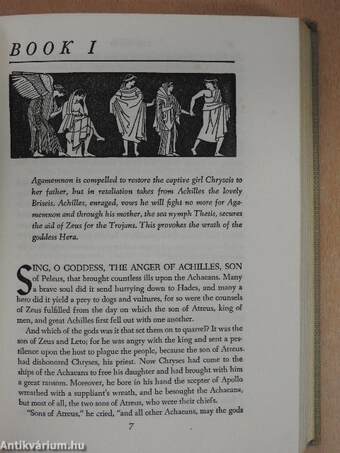1.067.317
kiadvánnyal nyújtjuk Magyarország legnagyobb antikvár könyv-kínálatát

VISSZA
A TETEJÉRE
JAVASLATOKÉszre-
vételek
The Iliad of Homer
| Kiadó: | Walter J. Black, Inc. |
|---|---|
| Kiadás helye: | New York |
| Kiadás éve: | |
| Kötés típusa: | Vászon |
| Oldalszám: | 391 oldal |
| Sorozatcím: | Classics Club |
| Kötetszám: | |
| Nyelv: | Angol |
| Méret: | 19 cm x 14 cm |
| ISBN: | |
| Megjegyzés: | Néhány fekete-fehér illusztrációval. |
naponta értesítjük a beérkező friss
kiadványokról
naponta értesítjük a beérkező friss
kiadványokról
Előszó
INTRODUCTION Sometime about
thirty-six or thirty-seven hundred years ago, historians say, the first
Greek tribes of whom we have any knowledge came down from the
northern mountains into the... Tovább
Előszó
INTRODUCTION Sometime about
thirty-six or thirty-seven hundred years ago, historians say, the first
Greek tribes of whom we have any knowledge came down from the
northern mountains into the coasts and plains of what was later called
Greece. They did not call themselves Greeks but Achaeans or, some-
times, Danaans, the folk, that is, of a mythical King Danaus, prolific
in daughters. They were a bold, untamed, half-civilized race, but the
people they proceeded to conquer had for some centuries been part
of a rich Aegean civilization, centered in the southern island of Crete.
The Achaean freebooters took over the strongholds of the Aegeans
and gradually many of their arts and habits of life, keeping, however,
certain ideas and practices of their own which made their culture at
various points different from that of the Aegeans before them. It took
them years to complete the conquest. Even then they remained for a
long time a warlike breed, living off the older population of workers
on the soil. When too much peace grew monotonous, they fought
among themselves or sailed away on piratical expeditions up and
down the surrounding seas. In leisure hours they listened to tales of
their own Achaean heroes and their exploits by land and water or of
their gods and goddesses and their miraculous participations in hu-
man affairs.
So the time passed. Eventually the Achaeans grew interested in
the cultivation of their acquired fields and vineyards, their herds of
cattle, sheep and swine. They learned to combine piracy with trade
and made the acquaintance of the highly developed civilizations of
Phoenicia and Egypt. Then, somewhere about the year 1100 b.c.,
their dominion was shaken by new migrations of northern Greeks,
who came as they had once come, streaming down from the moun-
tains, through Thessaly and on to the south. But this time one in-
vasion followed hard on another. At least two centuries were filled
XJ Vissza
Tartalom
CONTENTS
INTRODUCTION. By Louise R. Loomis n
PREFACE. By Samuel Butler 1X12
BOOK I: Quarrel between Achilles and Agamemnon. Achil-
les withdraws in anger from the war, and secures Zeus' aid for
his enemies, the Trojans. 7
BOOK II: Agamemnon's dream causes him to test his men.
Nestor and Odysseus incite the army to fight. Both sides "pre-
pare for battle. 22
BOOK III: Menelaus challenges Paris to single combat to
decide the war. Sacrifices are made to solemnize the truce. Paris
is rescued from defeat by Aphrodite. 45
BOOK IV: The Gods decide to intervene. Athene comes
from Olympus and incites Pandoras to break the truce. Aga-
memnon marshals his men. 54
BOOK V: Diomed performs great exploits with the help of
Athene. Ares, who aids the Trojans, is finally driven from the
field. 67
BOOK VI: Hector goes back to Troy to offer sacrifices. He
comforts Andromache and rebukes Paris, whom he finds with
Helen. The brothers return to the fray. 88
BOOK VII: Hector and Ajax meet in single combat, which
is halted by nightfall. The Greeks build a wall. Paris refuses
to give up Helen. 10*
BOOK VIII: Zeus forbids the gods to intervene. The Greeks
are forced back behind their wall, leaving the Trojans in com-
mand of the field. 1x3
vrn
THE ILIAD
BOOK DC: Agamemnon proposes a return to Greece. He is
chided by his chiefs. Achilles, besought, refuses to reenter the
fight. 127
BOOK X: In the night Agamemnon sends Diomed and
Odysseus to spy on the enemy. They learn the disposition
of forces and kill King Rhesus. 144
BOOK XI: Agamemnon leaves the field wounded:. Hector
leads the Trojans forward and the Greeks retreat. Nestor of-
fers a plan for deceiving the Trojans. 158
BOOK XII: The Trojans assail the wall on foot. The de-
fense is headed by the two Ajaxes. The Trojans pour over the
wall. 179
BOOK XIII: Poseidon, angered with Zeus, rallies the Greeks.
Idomeneus performs valorous deeds. Still the Trojans advance. 191
BOOK XIV: The Greeks are hard pressed. Hera, to distract
Zeus from aiding the Trojans, entices him to Mount Ida. The
fortunes of battle now favor the Greeks. 212
BOOK XV: Zeus, discovering Hera's guile, tells her the
Greeks will conquer Troy. Hector leads another attack, and
Achilles is told of the danger. 225
BOOK XVI: Patroclus, wearing Achilles' armor, puts the
Trojans to flight. In the pursuit he is disabled by Apollo,
then slain by Hector. 243
BOOK XVII: Trojans and Greeks struggle over the body of
Patroclus. The Greeks finally capture the body and make for
the ships. 265
BOOK XVIII: Achilles, enraged by Patroclus'death, decides
to reenter the conflict. Thetis asks Hephaestus to make him
new armor. 283
contents
IX
BOOK XIX: Agamemnon and Achilles are reconciled. The
Greeks prepare for battle. Achilles is warned of approaching
death. 298
BOOK XX: Zeus tells the gods they may take, part in the
war. Apollo incites Aeneas to attack Achilles, who slaughters
countless Trojans. 308
BOOK XXI: Angered by Achilles' carnage the River Sea-
mander overflows. The gods battle each other on the field. The
routed Trojans flee behind their wall. 321
BOOK XXII: Hector stands alone to face Achilles. He flees,
then turns and fights, tricked by Athene, and is slain. The
Trojans mourn. 336
BOOK XXIII: Achilles drags Hector's body to the Greek
camp. Sacrifices are offered in honor of Patroclus and funeral
games are held. 350
BOOK XXIV: Guided by Hermes, Priam goes to the Greek
camp to ransom Hector's body. Achilles, moved to pity, gives
it up. Hector's funeral is celebrated. 372
Témakörök
Megvásárolható példányok
Nincs megvásárolható példány
A könyv összes megrendelhető példánya elfogyott. Ha kívánja, előjegyezheti a könyvet, és amint a könyv egy újabb példánya elérhető lesz, értesítjük.











